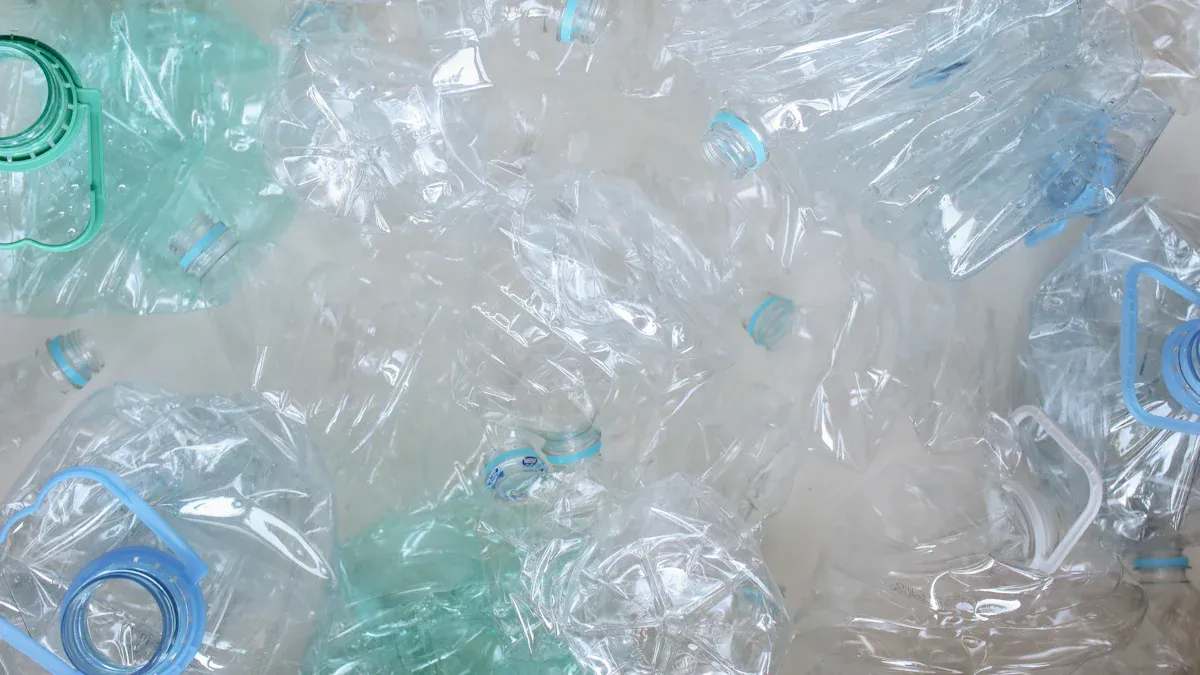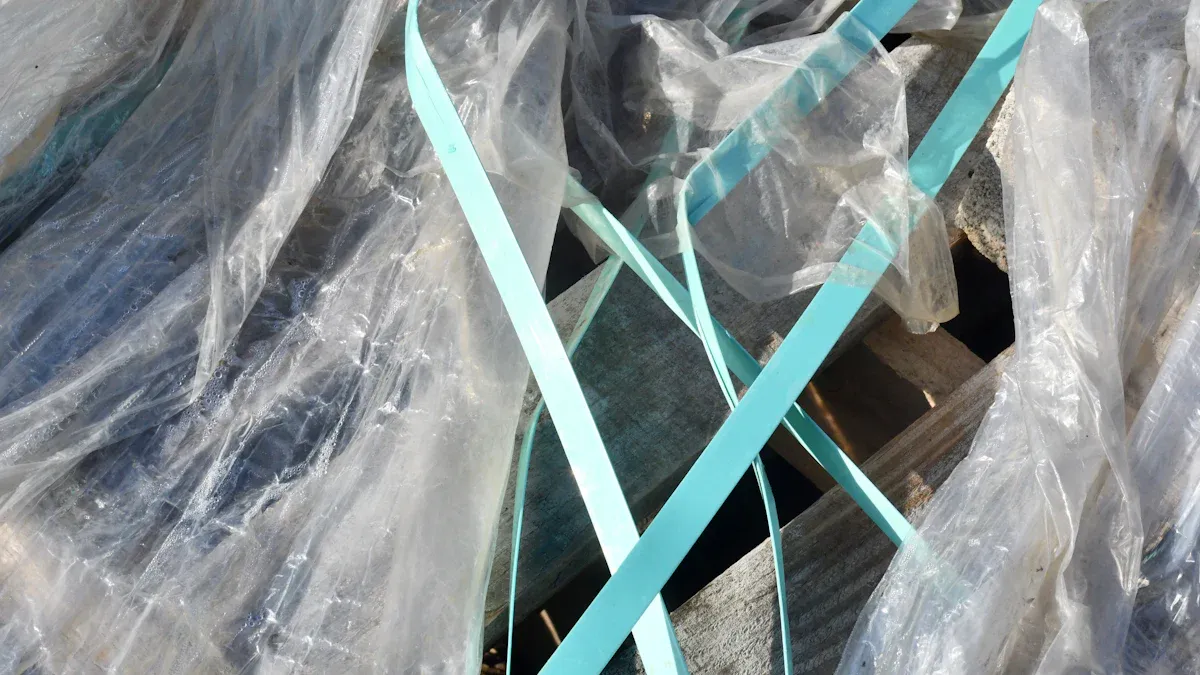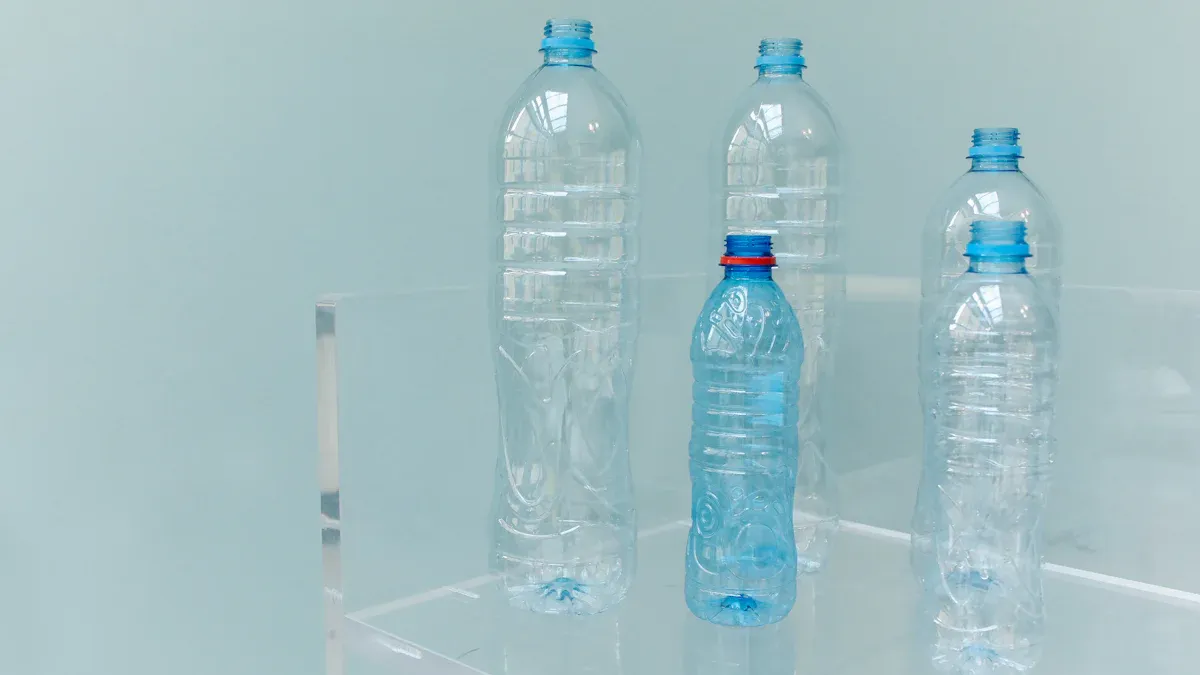How to Select the Best Clear PET Shrink Tubing for Your Needs

Choosing the right shrink tubing, such as clear PET shrink tube, is very important for projects. It helps bundle wires, insulate connections, or protect fragile parts. The electric car industry now uses 15 meters of tubing per car, up from 3 meters. Clear PET shrink tube is strong, clear, and handles heat well. As electronics and medical industries grow fast, picking the right tubing, like clear PET shrink tube, matters more than ever.
Key Takeaways
Clear PET shrink tubing is tough, heat-safe, and insulates well, making it great for many uses.
Pick the right shrink ratio for your project. A 2:1 ratio fits normal shapes, while 3:1 or more works for tricky shapes.
Measure the item carefully before choosing tubing. A tight fit gives better protection and looks neater.
Check for UL and RoHS labels to ensure safety, especially for medical or electrical uses.
Use a heat gun to shrink evenly. Practice on extra tubing to learn and avoid mistakes.
Understanding Clear PET Shrink Tubing

What is a clear PET shrink tube?
A clear PET shrink tube is a heat-shrinkable tube made from polyethylene terephthalate (PET). When heated, it shrinks tightly around items, forming a secure cover. This tubing is see-through, making it great for jobs needing visibility. It protects wires, cables, or delicate parts while keeping them easy to inspect or identify.
Here’s a simple breakdown of its technical details:
Specification Type | Details |
|---|---|
Electrical Properties | Strong insulation: > 4,000 V/mil, Constant: 3.3, Resistivity: 10^18 Ohm-cm |
Sterilization Methods | Works with ethylene oxide, gamma rays, and autoclaving (avoid repeated autoclaving) |
Biocompatibility | Safe for medical use (ISO 10993) |
Specification Standards | Check PET heat shrink tubing (PHST) standard requirements. |
Sizing Requirements | Best fit: 15% gap or less, Ratio: 1.1:1, Recovery >20% possible by stabilizing ends during heating. |
This table shows how useful and dependable clear PET shrink tubing is for many industries.
Common uses of clear PET shrink tubing
Clear PET shrink tubing is used in many fields. In electronics, it insulates wires and shields connections. In healthcare, it covers tools or devices needing sterilization. It’s also used in packaging to protect items while keeping them visible. Whether bundling cables or guarding fragile parts, this tubing works well.
Advantages of using clear PET shrink tubing
Why pick clear PET shrink tubing? First, it’s see-through, so you can check covered parts easily. Second, it provides strong electrical insulation for safety. Third, it’s safe for medical use and handles sterilization like gamma rays or ethylene oxide. Its strength and flexibility make it a top choice for professionals.
Tip: Always aim for a snug fit with clear PET shrink tubing. A tight fit looks tidy and offers better protection.
Key Factors to Choose Heat Shrink Tubing
Material properties of clear PET shrink tubing
When picking heat shrink tubing, knowing the material is key. Clear PET shrink tubing is special because of its great features. It gives strong electrical insulation, keeping wires safe from harm. Its strength is much better than others, making it dependable under pressure.
Here’s a look at its main material features:
Property | Description |
|---|---|
Insulation Properties | Offers strong electrical insulation, shielding wires from outside damage. |
Mechanical Strength | Much stronger than others, staying reliable under heavy use. |
Heat Resistance | Works well in temperatures from 60ºC (140ºF) to 125ºC (257ºF), great for hot environments. |
Durability | Boosts safety and stops problems, with strong structure for support. |
Flexibility | Makes devices easier to move, helpful for medical tools. |
UV Resistance | Shields parts from sunlight damage, good for outdoor use. |
Flame Retardancy | Meets UL94V-O safety rules, safe for risky jobs. |
These features make clear PET shrink tubing a solid pick for tough tasks. Its thin walls, from 0.00015 to 0.004 inches, are light but strong. It also covers sharp edges and stops leaks, making it last longer.
Tip: Always check for flame retardancy and UV protection for outdoor or risky jobs.
Shrink ratios: How to select the right one
Shrink ratios show how much the tubing shrinks to fit parts. Choosing the right tubing means matching the ratio to your needs.
Here’s a simple guide to common shrink ratios:
Shrink Ratio | Application Description |
|---|---|
Best for regular shapes, shrinking to half its size. Great for parts with even sizes. | |
3:1 or higher | Good for odd shapes, giving better coverage. A 4:1 ratio works well for flexible needs. |
For most jobs, a 2:1 ratio is enough. For odd shapes or more flexibility, pick 3:1 or 4:1.
Guidelines: Measure parts carefully to pick the right ratio. This ensures a snug fit and avoids waste.
Temperature requirements for shrinking and operation
Clear PET shrink tubing works in many temperatures. To shrink it, use heat of at least 60ºC (140ºF). It can handle up to 125ºC (257ºF) during use.
Think about the environment when using heat shrink tubing. If it’s very hot or cold, make sure the tubing fits those conditions.
Note: Use a heat gun or oven for even shrinking and no damage.
By following these tips, you can pick tubing that fits your project’s temperature needs and works well.
Sizing: Measuring and picking the right tubing
Choosing the correct size for heat shrink tubing is important. If it’s too small, it won’t fit your parts. If it’s too big, it won’t shrink tightly enough to protect. So, how do you pick the right size?
First, measure the width of the item you want to cover. Use a ruler or caliper to get an accurate size. Then, pick tubing with a slightly bigger diameter than your item. This makes it easy to slide on before shrinking.
Here’s a simple guide to follow:
Measure the widest part of your item.
Check the shrink ratio of the tubing. For example, a 2:1 ratio means it shrinks to half its size.
Match the tubing size to your item’s size after shrinking.
For instance, if your item is 5mm wide, choose tubing with a 10mm diameter for a 2:1 ratio. This ensures it shrinks snugly around your part.
Tip: Cut the tubing a little longer than needed. This gives extra room for adjustments during setup.
Also, think about the tubing’s wall thickness. Thicker walls are stronger and insulate better but may be less flexible. Pick what works best for your project.
Application environment: Water, chemicals, and heat
Where you use the tubing affects how well it works. Think about water, chemicals, and temperature changes.
If water is a concern, pick tubing that resists moisture. This is key for outdoor or wet areas. A tight seal keeps water from harming your parts.
For chemical exposure, choose tubing that won’t corrode. Some chemicals can damage materials over time. Clear PET shrink tubing is tough against chemicals, making it great for harsh conditions.
Heat is another big factor. Tubing must handle both shrinking and the working temperature. Clear PET tubing can take heat up to 125ºC (257ºF). This makes it perfect for hot jobs like in cars or factories.
Tests show clear PET shrink tubing stays strong in tough conditions. These tests check how it handles water, chemicals, and heat. Picking tubing that passes these tests ensures it lasts longer and works well.
Note: Always read the manufacturer’s details to confirm the tubing’s resistance to water, chemicals, and heat. This helps you avoid mistakes.
By thinking about the environment, you can choose tubing that protects your parts and lasts a long time.
Installation Tips for Heat Shrink Tubing

Best heating methods for clear PET shrink tubing
Heating clear PET shrink tubing the right way is very important. It helps the tubing fit tightly and look neat. A heat gun works best for this job. It gives steady heat and prevents damage to the tubing. If you don’t have a heat gun, try a hair dryer for small tasks. It may take longer but can still work.
Move the heat gun back and forth while heating. This stops one spot from getting too hot and makes the tubing shrink evenly. Start with low heat and increase it slowly if needed. Keep the heat gun 2-4 inches away from the tubing. This avoids burning or melting the material.
For bigger jobs, you can use an oven. Put the tubing-covered item in the oven at 60ºC (140ºF) to 125ºC (257ºF). This heats everything evenly but needs careful watching to avoid overheating.
Tip: Practice on a scrap piece of tubing first. This helps you learn the right heat level and distance.
Ensuring a secure fit during installation
A tight fit needs careful planning and measuring. Measure the widest part of the item you’re covering. Pick tubing that’s slightly bigger so it slides on easily before shrinking. Check the tubing’s shrink ratio to make sure it fits your needs.
Clean the item’s surface before starting. Dirt, grease, or water can stop the tubing from sticking well. Use a clean cloth and the right cleaner to prepare the surface.
Heat the tubing slowly, starting at one end and moving to the other. This pushes out trapped air and makes the tubing fit tightly. If you’re covering wires, make sure all exposed parts are protected. Use strong, high-quality tubing for better results.
Note: Don’t pull or stretch the tubing. Let the heat shrink it evenly for a secure fit.
Avoiding common installation mistakes
Mistakes can happen, but you can avoid them by being careful. Here are some common problems and how to fix them:
Skipping measurements: Always measure the widest part of the item and pick tubing that fits.
Using wrong tools: Use sharp scissors or cutters for clean edges. Rough cuts can cause uneven shrinking.
Uneven heating: Move the heat gun around to spread heat evenly. Staying in one spot can damage the tubing.
Overheating: Watch the temperature and keep the heat gun at a safe distance.
Not cleaning the surface: Clean the item well before starting. Dirt or grease can stop the tubing from sticking properly.
Shrinking too much: Heat the tubing slowly and stop when it fits snugly. Over-shrinking can weaken the tubing and make it less clear.
By avoiding these mistakes, you’ll get a better fit and stronger protection. Good installation makes the tubing last longer and work better.
Reminder: Take your time when installing. Rushing can lead to errors and lower the tubing’s quality.
Certifications and Compliance for Clear PET Shrink Tubing
Why UL and RoHS certifications matter
When picking heat shrink tubing, look for UL and RoHS certifications. These show the tubing is safe and meets strict rules. UL certification means the product has been tested for safety. This is very important for electrical work, as it lowers fire and shock risks.
RoHS compliance ensures the tubing has no harmful materials like lead. This makes it safer for people and the planet. If you’re using tubing in healthcare or electronics, these certifications are a must. They guarantee the product is safe, reliable, and eco-friendly.
Tip: Check for UL and RoHS labels before buying. It’s an easy way to confirm safety and quality.
How to check product quality and safety
You need tubing that meets high standards every time. But how can you be sure? Look for products that follow strict rules and quality checks.
Here are some key things to look for:
Biocompatibility: Safe for medical use, meeting ISO 10993 and USP Class VI.
Quality Control: Follows ISO 13485 rules to ensure top-notch production.
Clean Manufacturing: Made in clean rooms with advanced tools for precision.
Industry standards also help prove the product’s quality. The table below shows two important ones:
Standard | What It Checks |
|---|---|
ASTM D2732 | Tests how the tubing shrinks with heat, focusing on accuracy. |
ISO 14616 | Checks electrical properties to ensure the tubing works well and lasts. |
Choosing tubing that meets these standards means you can trust it. Whether for wires or medical tools, certified tubing works as expected.
Reminder: Always read the product’s paperwork to confirm it meets these standards. This small step can prevent big problems later.
Picking the best clear PET shrink tubing is simple. You now know about its features, shrink ratios, heat needs, and sizing tips. You’ve also learned how to install it and why UL and RoHS certifications are important.
Remember: Think carefully about your project’s needs. Consider the environment, how strong the tubing is, and safety rules.
By using these tips, you’ll choose tubing that fits well and works great. Ready to decide? You can do it!
FAQ
What is the best way to store clear PET shrink tubing?
Keep it in a cool, dry place away from direct sunlight. High temperatures or moisture can weaken its properties. Use a sealed container to protect it from dust and humidity.
Can I use a regular hair dryer to shrink clear PET tubing?
Yes, but only for small projects. A hair dryer works for low heat applications, but it may take longer. For better results, use a heat gun for even and faster shrinking.
How do I know if the tubing is shrinking evenly?
Watch for smooth, uniform shrinking without wrinkles or bubbles. Move the heat source back and forth to avoid overheating one spot. Practice on a scrap piece to perfect your technique.
Is clear PET shrink tubing safe for medical applications?
Yes, it’s biocompatible and meets ISO 10993 standards. It works well for sterilized environments and medical tools. Always check the product’s certifications before use.
Can I reuse clear PET shrink tubing after shrinking?
No, once it shrinks, it stays in its new shape. If you need to replace it, cut it off and use a fresh piece. Reusing can compromise its fit and protection.
See Also
Selecting Ideal Ultra-Thin PET Heat Shrink Tubing For Projects
Finding The Perfect FEP Heat Shrink Tubing For You
Choosing The Right FEP Autoclavable Heat Shrink Tubing
Key Considerations For Selecting FEP Shrink Tubing
Selecting Optimal FEP Biocompatible Heat Shrink Tubing For Uses

